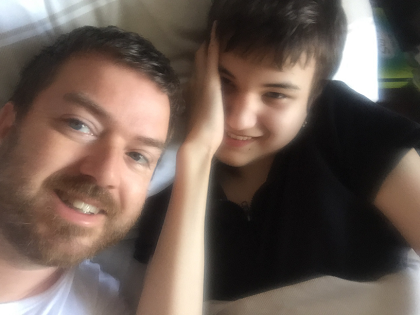James’ Autism is neurodiversity, a different way of ‘being’. His brain is wired differently to mine, he thinks differently to me, sees and responds to the world differently to me.
 Photo: R. Schaller, Unsplash CC0
Photo: R. Schaller, Unsplash CC0
Oh my days, that’s quite a blog post title isn’t it? All sorts of controversial topics wrapped up in there too. But it represents a compact summary of a bunch of things that have collided in the news, and in my mind.
Things that have in turn outraged, angered and deeply saddened me; things that have to be called out for what they are. Dangerous, harmful and tragically wrong. This is possibly the most serious, and maybe most explosive and controversial, blog post I have ever written; it took me a while to decide to write it, but I felt compelled to do so for the sake of the children involved, so here we go.
Recently, I saw stories circulating in the media again of parents giving their Autistic children bleach (or a drink containing bleach) to drink, having seen online posts that it was a ‘miracle mineral cure’ for Autism… Let’s just think about that again for a second…Parents giving their children bleach to drink, thinking it would ‘cure’ their child.
There is so much to unpack there that it’s almost hard to know where to begin. Clearly, bleach isn’t a ‘cure’ for anything, it is a dangerous cleaning substance that should never be ingested, but these stories, and there are many of them and many like them, also speak to me of the misplaced desperation of these parents.
The National Autistic Society recently issued this information about this dangerous practice-
Some parents are convinced that their children need to be ‘cured’, and that indeed there is a way to ‘cure’ Autism out there somewhere if only they can find it, even among the modern day ‘snake oil salesman’ ideas being touted like drinking bleach. In part I can understand their desperation; there are times when my 15-year-old Autistic son, James, can have me at my wits end, when I find it hard to cope, but then 15-year-old neurotypical teenagers can do that too! But there is no ‘cure’ for Autism, just as there is no ‘cure’ for a person’s gender or ethnicity; imagine the reaction if someone suggested that there was!
James’ Autism is neurodiversity, a different way of ‘being’; his brain is wired differently to mine, he thinks differently to me, sees and responds to the world differently to me. If he wasn’t Autistic, he simply wouldn’t be James-
The Psalmist puts it quite well in these well-known words… “How you made me is amazing and wonderful. I praise you for that. What you have done is wonderful. I know that very well.” Psalm 139:14 (NIrV)
 The author Mark Arnold and his son James.
The author Mark Arnold and his son James. But it’s not just at the crackpot ‘snake oil salesman’ end of the food chain where we see so called ‘cures’ for Autism being touted though. In the USA alone, approaching $1 billion is spent annually on Autism research looking for, among other things, a ‘cure’. Parents pour vast amounts of money into false promises of ‘cures’, often causing more harm than any good that may be perceived. I follow a number of organisations on social media that campaign to find a ‘cure’ for Autism, not because I believe in what they do, but because it is useful to see what they are up to. They trade in false hopes and promises that cannot be kept…
Then there are the organisations who offer behavioural therapies to ‘reprogramme’ Autistic children; to make them ‘normal’. Whatever successes these organisations might say they have, which is doubtful, they can come at the cost of the child; supressing who they really, truly, are, forcing them to be someone different to please others.
While thoughts about all of this were once again swirling around in my mind, news came through of the discussions being held at the Church of England Synod regarding valuing people with Down Syndrome. A motion affirming the dignity and humanity of people with Down Syndrome was discussed, just as a new form of pre-natal screening comes into practice in the NHS, able to identify when a pregnant woman may give birth to a baby with Down Syndrome.
Premier recently reported that “The screening means doctors will be able to tell a mother if there is a “high risk” her baby will be affected by the condition, knowledge which the Church welcomes, if it makes the mother more informed. However, leaders want parents to be aware that the lives of people living with Down’s Syndrome has considerably improved in recent decades and cited the Christian comedian Sally Philips’ documentary ‘A World Without Down’s Syndrome?’ where she highlighted ignorance surrounding the condition.
The Church of England said mothers who ask for this screening must be given results in a neutral fashion, such as not saying: “I’m sorry, I’ve got bad news for you” or leading them on a path towards termination, without providing full information about life with a child with Down’s Syndrome.”
The debate was reported in The Guardian here.
While it was disappointing that only 60% of Synod members turned up to the debate, the motion was agreed, but again this debate reveals the enormously difficult issues that surround these matters.
Screening in Iceland has resulted in, in their words, the almost total eradication of births of children with Down Syndrome, through termination of almost all babies identified as having the condition. I’m not going to get into the wider abortion debate here, but we could be seeing the first steps onto a very slippery slope. Screening for different conditions, leading to screening for neurodiversity, leading to screening for who knows what… Imagine the outcry, and rightly so, if the NHS started offering screening for a “high risk” of a child being LGBTQ+ for example, whereas screening for disability seems to be viewed very differently.
Now I don’t know what we would have done if, when we were pregnant with James, we had been told that he would be Autistic. Perhaps it would have been influenced by how we were told. But to think that there would have been even a chance that we would have terminated the pregnancy, perhaps led by the way we were given the news, breaks my heart.
James has a rich life and brings so much that is good into not just our lives but the lives of many. We are different, better, people because of James, and I doubt very much that I would be doing the work I am doing now had it not been for James coming into our lives. I in no way judge people who might make different decisions, all of our circumstances are different and we must make our own choices, but personally I am so glad that we have James in our lives.
And because of James, and the many children and young people with additional needs across the UK and beyond, I believe we have reached a line in the sand… Will we campaign to defend that line, defend their rights to life, the right to better more informed information for their parents, their rights not to be experimented on with quack ‘cures’ and ‘therapies’, their rights to be accepted for who they are and to be able live their life their way?
Perhaps these words of Jesus are a good way to finish, “A thief comes only to steal and kill and destroy. I have come so they may have life. I want them to have it in the fullest possible way.” John 10:10. (NIrV)
Amen!
Mark Arnold, Director of Additional Needs Ministry at Urban Saints. Arnold blogs at The Additional Needs Blogfather. This article was re-published with permission.

Las opiniones vertidas por nuestros colaboradores se realizan a nivel personal, pudiendo coincidir o no con la postura de la dirección de Protestante Digital.
Si quieres comentar o